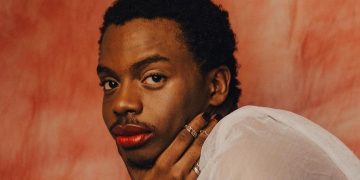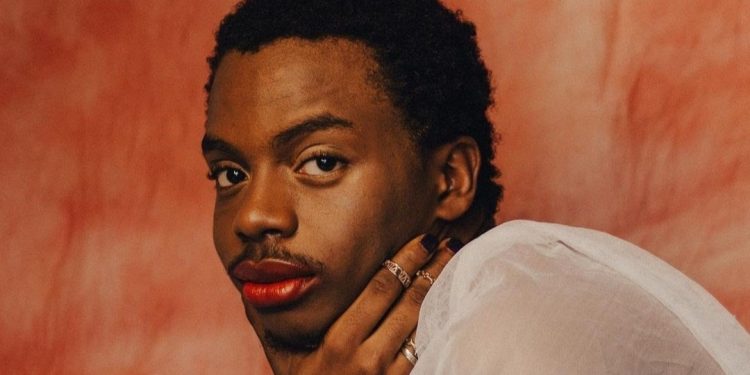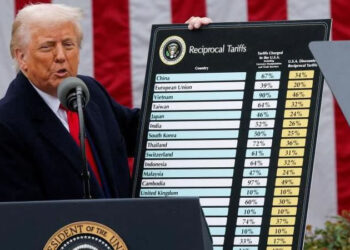Enioluwa Adeoluwa was in his first year in university the first time he tried make-up on. He was in the company of his female friends and while they applied different shades of foundation and concealer just as they had watched Jackie Aina do on YouTube, he thought to do the same. That was in 2014. Today, the 21-year-old is a beauty influencer with over a hundred thousand followers on Instagram, and has been nicknamed ‘lip gloss boy’ (reapplying lip gloss as he delivers a punchline has become a motif of his comic skits) by fans, even though he would rather be called ‘beauty boy’.
When he began making make-up tutorial videos for men on Instagram in 2019, a year after he had graduated from university, he never thought he would ever influence for beauty brands, he tells Dazed. “Because it is not something that is really popular in Nigeria, to kinda be popular for it is quite surprising.” He had just been fascinated with make-up and did not mind sharing how he came about his minimal look on social media.
Men or boys grooming with make-up is not a norm anywhere in the world. In a conservative country like Nigeria where dominant Pentecostal churches propagate doctrines that abhors make-up even for women, it is unheard of. Churches would go as far as to send their worshippers back home if they came dressed or groomed in a way they consider immodest or ill-befitting of Christians. Institutions like universities that should be progressive are not exempt. You’d often find big signposts at university gates, cautioning against what is termed indecent dressing. Male students are sometimes sent out of classrooms for braiding or locking their hair. Thus, much of Nigeria’s youth population tend to groom in gender-conforming styles.
For Enioluwa, who is now a Masters student at a private university in Lagos, wearing make-up is his way of expressing himself. “I feel like I can do anything, I can conquer anything. I can go out there and take anything, because if I can wear make-up in a society like Nigeria, what is stopping me from achieving my dreams? I feel really good, even to class I’ve won make-up, and I attend a very catholic school,” he says.
View this post on Instagram
Michael Okoh (better known as The Kohh), a 22-year-old make-up artist based in the ancient city of Ibadan in southwestern Nigeria, about 130 kilometres away from Lagos, was fascinated by the make-up transition process highlighted by the before and after picmix trend of 2015/2016. “I used to be amazed. Like, how do people go from this to this?” So, he attended two make-up tutorial classes. But the teaching was more theoretical than practical and he couldn’t learn anything. He decided to teach himself; he watched a lot of make-up tutorial videos on YouTube and Instagram and would then practice on his face. The more he bettered his skill, the more his passion grew. When he became confident enough in his abilities, he began to practice on other people’s faces.
A male make-up artist is not a common phenomenon in Nigeria, says Jameen Jude, another male make-up wearing MUA based in Nigeria’s capital city of Abuja, whose journey to becoming one developed purely out of self-interest. And so he is bothered that he might not reach his full potential in Nigeria. “I worry because in Nigeria we don’t see a lot of men who have (an) interest in make-up. And if you do, you will be labeled as something else,” he says. “If you do your research well, you would find out that the top make-up influencers and artists in the world are men. Examples are James Charles, Danny MUA, Patrick Starr, and Jeffree Star.”
Kohh doesn’t share the same sentiments. “Honestly, I never worried if I was going to make it like my female counterparts, I don’t think I ever had that thought,’ he said. He believed his work would speak for him in the long run. Today, he has almost 10,000 followers on his personal Instagram page where he shares pictures and videos of himself glammed up in elaborate make-up, and he is one of the most sought-after makeup artists in Ibadan.
However, his made-up face means he is the subject of ridicule from online trolls. “It is very constant. I get a lot of hate comments, homophobic comments,” he says. “But I’ve just seen it as part of the process. Not everybody is going to like you.” When in a physical space, he gets harassed by strangers. “I’ve had people walk up to me while engaging in a conversation, and they just say something nasty or something very inappropriate. Sometimes it does hit me but I’ve learned to move past it,” he says.
View this post on Instagram
Enioluwa isn’t a stranger to homophobic comments and so has grown a thick skin. “Growing up, I heard worse things even when I wasn’t wearing makeup, just because I’m effeminate, and so why should I be bothered now?” Jameen, who has also been subject to homophobic comments from online trolls, does not mind if people presume he’s gay because he wears make-up. “I don’t care what people say about me or whatever opinion they have,” he says. “It is their opinion and it really doesn’t affect me. They might be right. They might be wrong. I am not looking for acceptance or validation from anybody.”
Queer profiling, however, puts them at possible risk of harassment and brutality from the police. In 2014, Nigeria’s former President Goodluck Ebele Jonathan signed into law the Same Sex Marriage (Prohibition) Bill, which not only prohibits same-sex marriage but criminalises sexual relationship between humans of the same gender. This law has given the Nigerian police, especially its now-defunct notorious unit SARS (for Special Anti-Robbery Squad), the temerity to harass anyone they consider gay due to how they are dressed, especially if their grooming is gender-unconventional.
Ezra Olubi, cofounder and chief technical officer of the fintech company Paystack that was recently acquired by Stripe to facilitate e-Commerce across Africa in a deal worth over $200 million, wears his signature red lipstick even in professional spaces. The police have accosted him on more than one occasion, and have demanded to search his phone to look through his texts and images in order to determine his sexuality.
my friend invited me to her wedding party and all i heard was "ezra get dressed!" pic.twitter.com/oMdlP5A0JG
— Ezra 'God' Olubi (@0x) April 10, 2021
Several queer and gender non-conforming Nigerians have faced similar experiences. The police reason that for any man to wear make-up or paint their nails, they must be gay, and so use the SSMPA bill as a pretext to arrest or extort their victims. This is why the queer community came out en masse and lent their voice during #EndSARS protests of October 2020 to demand an end to police brutality, and for the disbandment of the rogue police unit, SARS. Months later, even though SARS is no more, many Nigerians still complain about abuse from the police.
Enioluwa confirms to me that more Nigerian men than it seems are interested in make-up. He says a number of guys tag him when they post images of themselves wearing make-up. He is glad that he is a sort of role model to these boys and men, just like how he is inspired by the likes of Bretman Rock and James Charles. But even though many are happy to post pictures on social media, not many are willing to go out wearing make-up for fear of not only battling with uncomfortable stares from the public but also harassment and possible brutality from the police. Kohh wishes he could go out more wearing make-up.
“Even if I wasn’t a make-up artist, I would still be curious about make-up and would definitely want to experiment at some point,” Kohh says. “It’s my way of expressing myself, you know everybody is dancing, everybody is singing, everybody is doing this. Wearing make-up… I think it has helped to bring out my personality, it has helped me communicate to people without saying a word. Through my videos, my pictures, my make-up, people can really see who this person is. This is what this guy is all about. This is his passion.”
The visibility of men like Enioluwa, The Kohh, Jameen, and Mr Olubi on social media is surely changing people’s perspectives on make-up. Kohh is honoured to be part of this movement. “I’ve really heard people tell me that I have paved way for femme boys or boys that would like to wear make-up,” he said. “It’s been really good, being able to make people happy and being able to show that no matter what you are, you can always be who you are, be comfortable in your own skin regardless of what people think or what people say.”
The article Meet the Nigerian Men Fighting Social Conservatism With Make-up was published by dazeddigital.




































